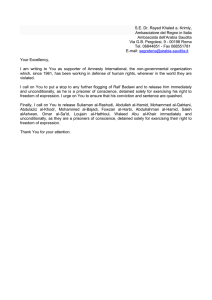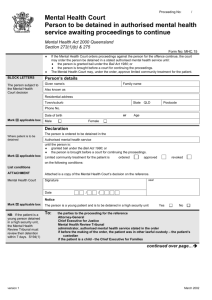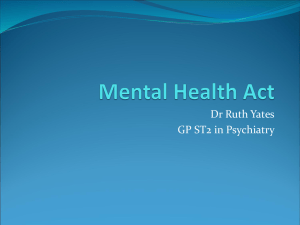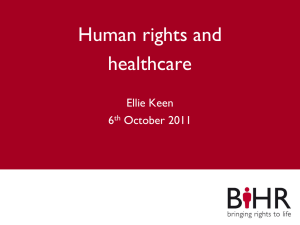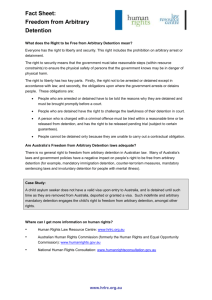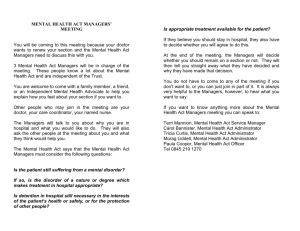Factsheet Detention under the Mental Health Act
advertisement
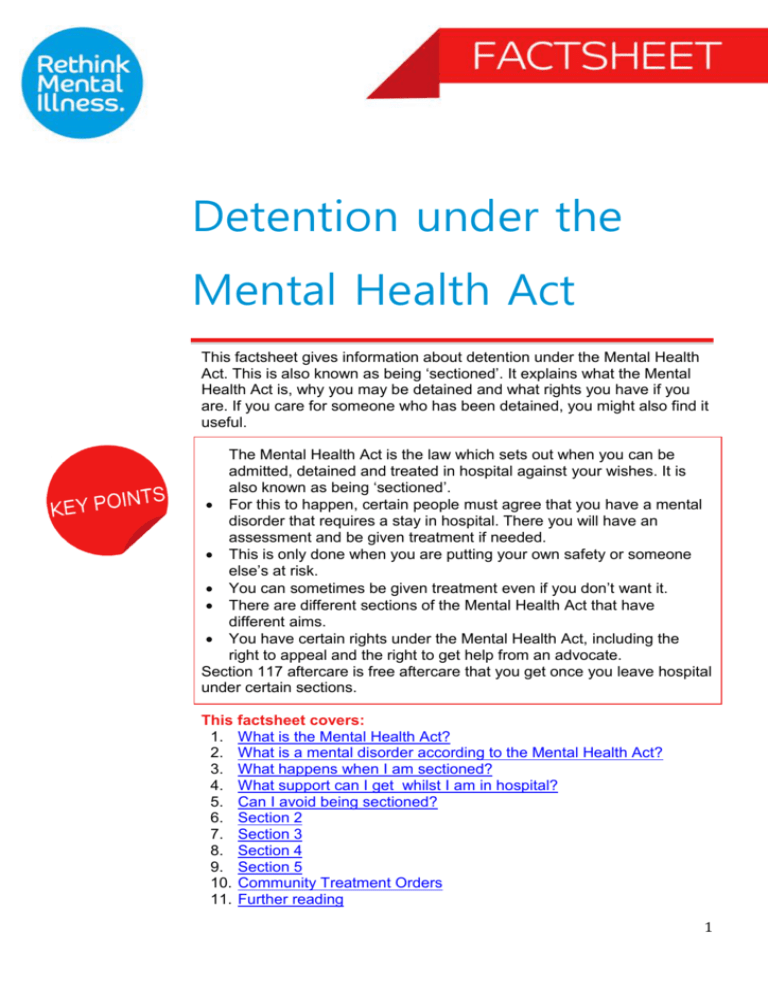
Detention under the Mental Health Act This factsheet gives information about detention under the Mental Health Act. This is also known as being ‘sectioned’. It explains what the Mental Health Act is, why you may be detained and what rights you have if you are. If you care for someone who has been detained, you might also find it useful. The Mental Health Act is the law which sets out when you can be admitted, detained and treated in hospital against your wishes. It is also known as being ‘sectioned’. For this to happen, certain people must agree that you have a mental disorder that requires a stay in hospital. There you will have an assessment and be given treatment if needed. This is only done when you are putting your own safety or someone else’s at risk. You can sometimes be given treatment even if you don’t want it. There are different sections of the Mental Health Act that have different aims. You have certain rights under the Mental Health Act, including the right to appeal and the right to get help from an advocate. Section 117 aftercare is free aftercare that you get once you leave hospital under certain sections. This factsheet covers: 1. What is the Mental Health Act? 2. What is a mental disorder according to the Mental Health Act? 3. What happens when I am sectioned? 4. What support can I get whilst I am in hospital? 5. Can I avoid being sectioned? 6. Section 2 7. Section 3 8. Section 4 9. Section 5 10. Community Treatment Orders 11. Further reading 1 1. What is the Mental Health Act? The Mental Health Act 1983 is the law which sets out when you can be admitted, detained and treated in hospital against your wishes. This is only done if you are putting your own safety or someone else’s at risk and you are suffering from a mental disorder. Because the Mental Health Act has different sections, it is commonly known as being ‘sectioned’. The Mental Health Act covers what rights you have, how you can leave hospital and what aftercare you can expect to get. The Act applies in England and Wales. This factsheet only covers the ‘civil sections’ of the Mental Health Act, and does not cover sections that involve criminal law. You can find more information about forensic sections in these factsheets: Section 35 Section 36 Section 37 Section 37/41 Section 38 Section 47/49 Section 48/49 at www.rethink.org. Or call 0300 5000 927 and ask for the information to be sent to you. Top 2. What is a mental disorder according to the Mental Health Act? The Mental Health Act defines the term ’mental disorder’ as ‘any disorder or disability of mind'. It includes mental health conditions such as: schizophrenia depression bipolar disorder anxiety disorder obsessive-compulsive disorder (OCD) eating disorders, and personality disorders. It also includes other conditions such as dementia, changes in behaviour due to brain injury, mental disorders due to drug use and autistic spectrum disorders. The definition includes learning disability only where it is associated with abnormally aggressive or seriously irresponsible behaviour.1 If you have problems with alcohol or drug use, you can only be sectioned if you have a mental disorder as well as a drug or alcohol problem.2 You can get more information on mental health problems and drugs and alcohol in our ‘Dual Diagnosis’ factsheet from www.rethink.org. Top 3. What happens when I am sectioned? When you are sectioned, three people must agree that you need to be detained in hospital. This is not always the case and depends on how urgent the situation is. Usually, the three people would be: an Approved Mental Health Professional (AMHP) or the nearest relative a doctor who has been given special training (known as a section 12 approved doctor) a registered medical practitioner (another doctor). Normally they will make this decision by interviewing you. During the interview you may be asked about a number of things, including: how you are feeling thoughts that you are having any plans you may have made to harm yourself or others your lifestyle your daily routine whether you have been taking your medication whether you have been using drugs or alcohol your living situation The interview may happen at your home, in hospital, in a place of safety or in a police station. If you are not in hospital they will usually arrange for you to be taken there in an ambulance. Sometimes the police may accompany the medical professionals or take you to hospital. The two doctors must agree that you are suffering from a mental disorder and that you need to be detained in hospital for assessment or treatment. They must also agree that it is in the interests of your own health, your own safety or to protect the safety of other people. If possible, one of the doctors should already know you. The role of an AMHP can be carried out by social workers, psychologists, occupational therapists and nurses. The AMHP normally gives a nonmedical view about detention. This might include looking at social aspects such as your living situation or whether you are looking after yourself properly.3 The AMHP will then decide whether to make an application to a hospital for a bed for you. Whoever makes the application must have seen you within the past 14 days. The doctors must have seen you together or within five days of each other. The nearest relative may be involved depending on the section and whether it is appropriate for them to be involved. You can find out more about the nearest relative at www.rethink.org Top 4. Can I avoid being sectioned? You might feel that you do not need to be sectioned. If this is the case, you should let the professionals know the reasons why. You may want to explain more about how things are at home and what support you have in place. They should listen to what you have to say and consider all alternatives to detaining you under the Mental Health Act.4 If you wish to have a friend or family member with you during a Mental Health Act assessment, or if you feel particularly anxious, you should let the AMHP or your nearest relative know. Top 5. What support can I get whilst I am in hospital? You might find that being taken to hospital against your will is stressful and upsetting. You may find it useful to get support from an Independent Mental Health Advocate (IMHA). The aim of an IMHA is to help you make decisions about your care and treatment. They can also help you find out what your rights are. You can ask about seeing an IMHA when you are in hospital. The hospital staff should give you details of the service. You can’t get help from an IMHA if you are under an emergency section (Section 4), holding powers of the Mental Health Act (Section 5), or in a place of safety under police powers (section 135 or 136). If you are an informal or voluntary patient (meaning you are in hospital but not under section), you are not able to access an IMHA unless you are being considered for neurosurgery for your mental disorder, or are under 18 and are being considered for electroconvulsive therapy (ECT).5 If you are under the Mental Health Act and wish to appeal, you can get free legal representation at your Tribunal under the Legal Aid scheme. The ward you are on is likely to have a list of mental health solicitors who will be able to advise and represent you. You can also search for mental health solicitors on the Civil Legal Advice website (http://find-legaladvice.justice.gov.uk/) or by calling Civil Legal Advice on 0845 345 4 345 (Monday to Friday 9am to 8pm, Saturday 9am to 12.30pm). You can still get advice from a solicitor if you have help from an IMHA. 6. Section 2 Under a section 2 (s2), you are detained in hospital for assessment of your mental health and to get any treatment you might need. An assessment will normally look at: whether you suffer from a mental disorder which type of mental disorder you have whether you need any treatment and how you might respond. You will be placed under a s2 if you have not been assessed in hospital before or if you have not been assessed in hospital for a long time. How is a section 2 carried out? To be placed under a s2: an application for admission to hospital under a s2 must be made by an Approved Mental Health Professional (AMHP) or your nearest relative. they must have seen you within 14 days of making the application. you must be seen by two separate doctors. One of these must have had specialist training to undertake this role. the doctors must have seen you within 5 days of each other. admission to hospital must be arranged within 14 days of the last medical examination. How long can I be detained for? You can be kept in hospital for up to 28 days, but this doesn’t mean you must stay that long. A s2 can’t be renewed but you may be transferred onto a section 3 (see below). What are my rights on a section 2? You have the following rights when you are detained under a section 2: you have the right to appeal against your detention to a Tribunal during the first 14 days that you are detained. you have the right to appeal to the Mental Health Act managers. you can ask for the help of an Independent Mental Health Advocate who can help you to raise any issues you have with your care and treatment. You should be given a Patient Rights Leaflet by a member of the hospital staff which tells you about your legal rights. Can I be treated against my will? Under s2, you can’t refuse treatment. However some treatments can’t be given to you without your consent unless certain criteria are met. These treatments include electro-convulsive therapy (ECT). If you are unhappy about your treatment, you should talk to your named nurse or psychiatrist. An Independent Mental Health Advocate may be able to help you put your case forward. Who can discharge me? You can be discharged from s2 by: The doctor responsible for your care in hospital (known as the Responsible Clinician) The Mental Health Act managers Your nearest relative (although this can be overruled by the Responsible Clinician) The Tribunal What sort of aftercare can I expect? For many people the time after you have been discharged is a crucial period. This is because returning to your home and community can be stressful, particularly if you have been in hospital for a long time. Before you are discharged, a care plan should be made under the Care Programme Approach (CPA) which will look at how your needs will be met. Many hospitals also agree to contact you within 7-14 days of discharge to see how you are getting on. Top 7. Section 3 Under a section 3 (s3) you are detained in hospital for treatment. Treatment might be necessary your health, your safety or for the protection of other people. You can be detained under s3 if you are well known to mental health services and there is no need for you to be assessed under s2. Alternatively, you may be detained under s3 following an admission under section 2. How is a section 3 carried out? To be detained under a s3: an application must be made by an Approved Mental Health Professional (AMHP) or your nearest relative. they must see you within 14 days of making the application. you must be seen by two separate doctors. One of these must have had specialist training to undertake this role. the doctors must have seen you within 5 days of each other. admission to hospital must be arranged within 14 days of the last medical examination. How long can I be detained for? You can be detained for up to 6 months, but you may be discharged before this time is up. Detention under s3 can be renewed for a further 6 months. After that, detention can be renewed for further periods of one year at a time. A s3 can only be renewed if you have been given an assessment by the doctor responsible for your care in hospital, during the two months before your s3 is due to end. What are my rights on a section 3? You have the following rights when you are detained under section 3: you have the right to appeal against detention to a Tribunal once during the first six months of detention. if your s3 is renewed, you can appeal once during the second six months. You can then appeal once during each one year period. you have the right to apply for discharge to the Mental Health Act managers at any time whilst you are detained. you can ask for the help of an Independent Mental Health Advocate who can assist you to raise any issues you have with your care and treatment. You should be given a Patient Rights Leaflet by a member of the hospital staff which explains your legal rights. Can I be treated against my will? Under a s3 you can’t refuse treatment. You can be treated against your will for three months, but after this time you have to be seen by a Second Opinion Appointed Doctor (SOAD). A SOAD will give you an assessment to see if they think that the treatment is needed. This means that after three months, treatment can only be given without your consent with SOAD approval.6 You can’t be given certain treatments without your consent unless specific criteria are fulfilled. These treatments include electroconvulsive therapy (ECT). If you are unhappy about your treatment you should talk to your named nurse or psychiatrist. An Independent Mental Health Advocate (IMHA) may be able to help you put your case forward. Who can discharge me? You can be discharged from a s3 by: The doctor responsible for your care in hospital (Responsible Clinician) The Mental Health Act managers Your nearest relative (although this can be overruled by the Responsible Clinician) The Tribunal What sort of aftercare can I expect? You can get free aftercare when discharged from a section 3. This is known as section 117 aftercare. You can get more information about Section 117 aftercare at www.rethink.org. Top 8. Section 4 Section 4 (s4) is used in emergency situations. You will be detained in hospital for an assessment of your mental health for a shorter period of time. It needs the recommendation of only one doctor (unlike a section 2, which needs two medical recommendations) You can be detained under a s4 if: you need an assessment or possible medical treatment; and you need to be detained in the interests of your own health, your own safety or to protect other people; and it is urgent and necessary that you are admitted and detained under section 2; and using section 2 would involve an "undesirable delay" - meaning it might take longer than normal to carry out a s2 assessment. How is a section 4 carried out? To be detained under s4: an application for admission to hospital under a s4 must be made by an Approved Mental Health Professional (AMHP) or your nearest relative. you must also be seen by a doctor (preferably one that knows you or one that has been approved under the Mental Health Act). the doctor and the applicant must have seen you within the last 24 hours. You must be admitted to hospital within 24 hours of being seen by the doctor or from when the application was made. How long can I be detained for? You can be detained for up to 72 hours but this does not mean that you will be kept for this long. A second doctor should assess you as soon as possible after you are detained. They will decide whether the s4 should be changed to a section 2. What are my rights on a section 4? You may be given a Patient Rights Leaflet by a member of the hospital staff which explains your legal rights. Can I be treated against my will? Under a s4 you can refuse treatment. You must give consent before any treatment is given to you. Sometimes treatment can be given without your consent. This is only if: you do not have the capacity to make a decision about treatment and the treatment is in your best interests. you need treatment in an emergency to prevent serious harm to yourself or others. Who can discharge me? You can be discharged from s4 by: The doctor responsible for you care in hospital (Responsible Clinician) Top What sort of aftercare can I expect? It is unlikely that you will be discharged back home immediately after a s4. You will usually be admitted as either a voluntary or informal patient or be detained under the Mental Health Act for a period of time. 9. Section 5 You can be held under a section 5 (s5) by a doctor or nurse to stop you from leaving hospital as a voluntary or informal patient. It can also be used if you are having treatment in a general hospital for a physical condition. You should only be held under a s5 when it is not possible or safe to use sections 2, 3, or 4. A section 5(2) is known as the doctor's holding power. The doctor in charge of your care at the time (or a doctor nominated by the doctor in charge of your care) must write a report explaining why you need to be detained and why informal treatment is inappropriate. A s5(2) can be used both in a mental health hospital and a general hospital. A section 5(4) is known as the nurse's holding power. Nurses must be of a ‘prescribed class’, which means that they should be registered in the area of mental health or learning disabilities nursing. This power can only be used when: You must be immediately stopped from leaving hospital for your own health or safety or for the protection of others It is not possible to get a doctor to attend who can section you under s5(2) How long can I be detained for? Under a s5(2), you can be held for up to 72 hours. This is not renewable. You must be assessed as quickly as possible by an Approved Mental Health Professional (AMHP) and doctors for possible admission under the Mental Health Act. Under s5(4), you can be held up to 6 hours. This is not renewable. The holding power ends as soon as a doctor arrives. The doctor may transfer you onto a s5(2) or you may continue as a voluntary patient. If you need to be detained under a section 2 or 3, an assessment by an Approved Mental Health Professional (AMHP) and doctors must be arranged as quickly as possible. What are my rights on a section 5? If you are placed on a s5(2) or s5(4) you may be be given a Patient Rights Leaflet by a member of the hospital staff which explains your legal rights. Can I be treated against my will? Under sections 5(2) and 5(4), you can refuse treatment and you must give your consent for any treatment that is given to you. Sometimes treatment can be given without your consent. This can happen when: you do not have the capacity to make a decision about treatment and the treatment is in your best interests. you need treatment in an emergency to prevent serious harm to yourself or others. Who can discharge me? You will be automatically discharged from s5 once the detention time ends, and if you have not been transferred onto a further section of the Mental Health Act. What sort of aftercare can I expect? It is unlikely that you will be discharged back home immediately after a s5(4) or s5(2). You will usually be admitted as either a voluntary or informal patient or detained under the Mental Health Act for a period of time. However, when you are discharged a care plan should be written under the Care Programme Approach (CPA). Many hospitals also agree to contact you within 7-14 days of discharge to see how you are getting on. Top 10. Community Treatment Orders You may be placed on a Community Treatment Order (CTO) and put under supervised community treatment when discharged from certain sections of the Mental Health Act. You can be discharged under a CTO if: you have been detained under section 3 of the Act or you have been diverted to hospital from the criminal justice system under certain sections of the Mental Health Act. You can’t be placed under a CTO if you have been detained under section 2 or you are a voluntary patient. A CTO means that you must meet certain conditions to stay in the community. You may be taken back to hospital if you don’t meet the conditions of the CTO. You can find more information about CTOs at www.rethink.org. Or contact 0300 5000 927 and ask for a copy to be sent to you. Top 11. Further reading You can find more information on www.rethink.org about: Discharge from detention under the Mental Health Act Nearest relative Community Treatment Orders (CTOs) Section 117 Aftercare Advocacy Complaining About the NHS or Social Services How to get legal advice and assistance Going into hospital – for patients There is information about Tribunals available at the Tribunals Service website http://www.mhrt.org.uk. Top 1 s1(2A) Mental Health Act 1983 (MHA) s1(3) MHA 3 South London and Maudsley NHS Foundation Trust. The Maze, A Practical Guide to the Menal Health Act 1983 (Amended 2007). London: CPI William Clowes Beccles; 2010 4 Department of Health. Mental Health Act 1983 Code of Practice. UK: TSO (The Stationery Office); 2008 5 As note 4 6 S58 MHA 2 © Rethink Mental Illness 2014 Last updated February 2014 Next update February 2016 Version: 6 This factsheet is available in large print.
